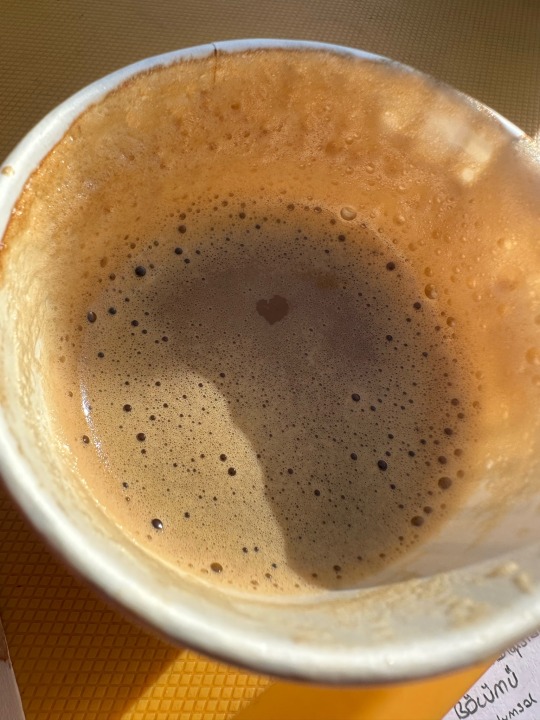#한국어
Text
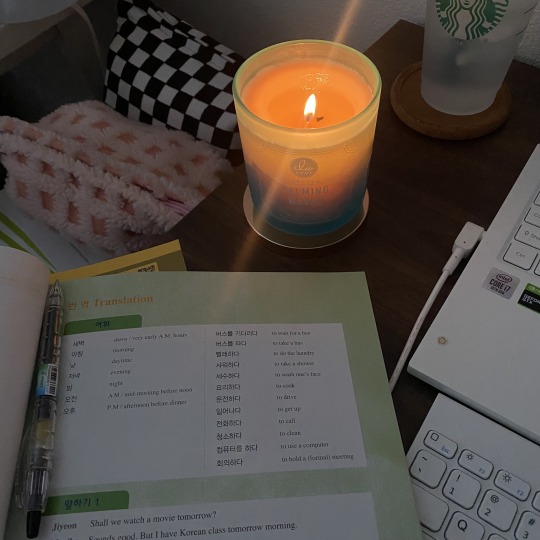
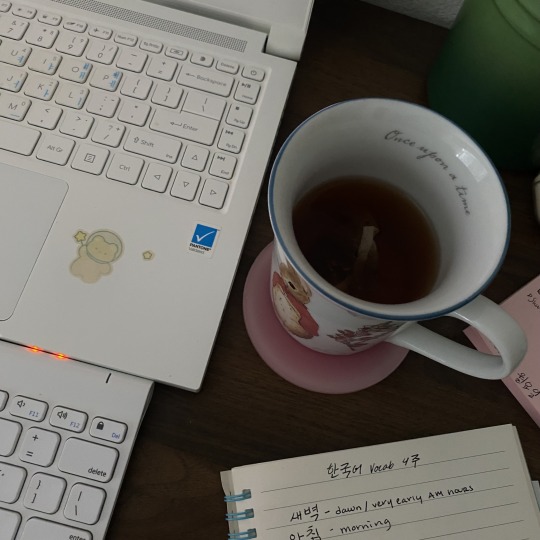
04.08.2024 — What a gloomy day today. We are having our second 가을, as we usually do this time of year in WA state.
Today I studied new vocabulary, reviewed last week’s material, talked with my 교수님 a bit, and updated the course Quizlet.
That’s all for today, folks.
#한국어#학생#한국어 공부#college student#studying#korean language#studyblr#language student#language study#studying at home#online student#student#korean#language learning#learning korean#student life#study blog#studying inspo#study motivation#studying korean#college work#hangeul#hangul
77 notes
·
View notes
Text
한국 전래동화에 나오는 어회와 문법 ! - Vocabulary and grammar in traditional Korean fairytales !
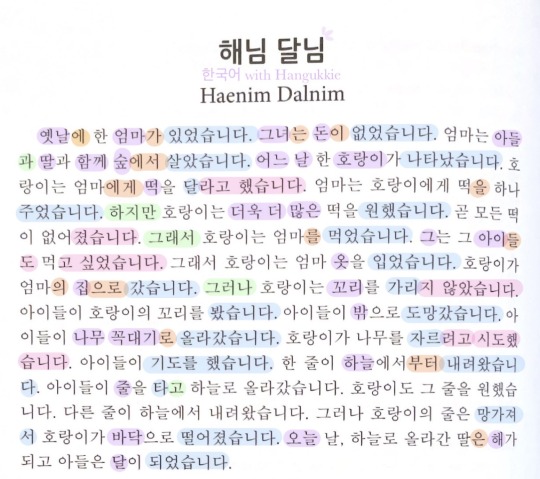
English Translation:
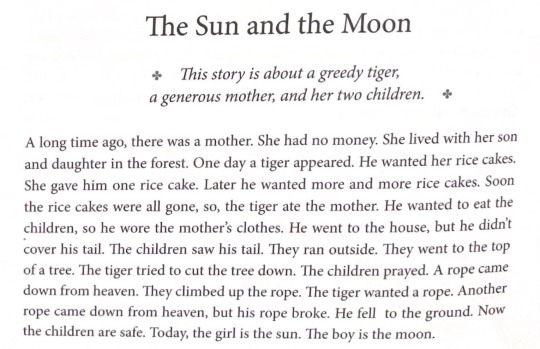
———————————————————
Vocabulary:
옛날 - Olden days
옛날에 - Once upon a time
어머니/엄마 - Mum
그녀 - She/Her
돈 - Money
아들 - Son
딸 - Daughter
함께 - Together
숲 - Forest
어느 - Which
날 - Day
호랑이 - Tiger
떡 - Rice cake
더욱 더 - More and more
많이/많은 - Many/A lot
그 - He/Him
아이 - Kid/Child
아이들 - Kids/Children
옷 - Clothes
집 - House
꼬리 - Tail
밖 - Outside
나무 - Tree
꼭대기 - The top
하늘 - Sky
줄 - Rope
바닥 - Floor
오늘 - Today
해 - Sun
달 - Moon
Grammar - Verbs:
있다 - To exist
없다 - To not exist
살다 - To live
나타나다 - To appear
달다 - To ask/To request (In this context)
주다 - To give
원하다 - To want/To wish/To desire
먹다 - To eat
가다 - To go
가리다 - To cover
보다 - To see
도망가다 - To run away
올라가다 - To go up
자르다 - To cut
기도를 하다 - To pray
내리다 - To get off
떨어지다 - To fall
된다 - To become
Grammar - Sentence Forms:
라고 하다 - For indirect quotations
지다 - To become
도 - Too/Also/As well as
고 싶다 - To want
지 않다 - Is not
려고 - To intend to
시도하다 - To attempt to
Grammar - Connectives:
과 - And/With (With 받침)
하지만 - But
그래서 - So
그러나 - But/However
하고 (고) - And/With
Grammar - Markers/Particles:
에 - To/At (Location and time marker)
가 - Subject particle
는 - Topic particle
이 - Subject particle (With 받침)
에서 - At/In/On/From (Location marker)
에게 - To/For
을 - Object particle (With 받침)
를 - Object particle
들 - Plural marker
의 - Possessive marker
으로 - By/As/For/To/Towards/With (Directional marker)
로 - By/As/For/To/With (Directional marker - with 받침)
부터 - From/Since (Location and time marker)
은 - Topic particle (With 받침)
#korean language#korean langblr#korean#langblr#korean study blog#korean studyblr#study blog#studyblr#korea#korean vocab#korean vocabulary#korean vocab list#Korean stories#Korean fairytales#Korean folktales#korean folklore#한국#한국어#한국어 공부#한국어 읽기#한국어 어휘#한국어 단어#한국어 문법#공부#읽기#어휘#단어#문법#한국 전래동화#전래동화
364 notes
·
View notes
Text
Korean Slang을 좀치네요~
A casual phrase that was been around for a while
뭐뭐.. “좀 하다”
“Done a bit of this / Dabbled in / Done this a bit in my day”
Simply put, it is a playful way of saying someone has done something quite a bit or is pretty good at something. Which is why it’s generally used with the ~네(요) or 거든(요) grammar endings.
For example
“야 너 롤 해??”
“Do you play LoL (League of Legends)?”
“응, 나 좀 하지”
“Yeah, I play a bit”
But this has changed from 하다 (To do) to 치다 (To play a sport or instrument) but still can be used in everyday context.
So instead of saying
“너 베이킹 잘 하네!”
“You’re pretty good at baking!”
You can say
“와아, 이 빵 잘 구웠네. 너 좀 치네”
“Woah, you baked this bread so well. Guess you’re pretty good at baking”
As always, it’s not a direct translation, but you get the gist of it.
이제 구독자분들도 한국어를 좀 치시네요~
(Now you (the readers) know a bit of Korean too)
#korean#한국어#한국어 공부#studyblr#한국어배우기#learning korean#learn korean#slang#korean language#korean slang#language#kpop#korean vocabulary#south korea#seoul
220 notes
·
View notes
Text
Vocabulary: house (rooms)
2023년 9월 19일
안녕하세요!
Today, we will learn how to say each room of the house!
House: 집
Bathroom: 화장실
Dining Room: 식당
Bedroom: 침실
Kitchen: 부엌
Living room: 거실
Downstairs: 아래층
Upstairs: 윗층
Garage: 차고
Garden: 정원
#gigiskjourney#korean langblr#korean language#korean learning#korean study#korean vocab list#korean vocabulary#learn korean#learning korean#studyblr#south korea#korean grammar#korean#korea#korean study blog#study korean#studying korean#한국어
178 notes
·
View notes
Text
Semester in SK: Korean Curse Words
안녕하세요 여러분! I’m sharing yet another Instagram post with you all--this one is about a bunch of Korean curse words! Very silly, I know, but curse words are a big part of any language and can be fun to learn about! Of course, be careful when using these and please do not use them often--I’m just sharing them for fun and so you can recognize them if you hear them :) I hope you enjoy! 화이팅!

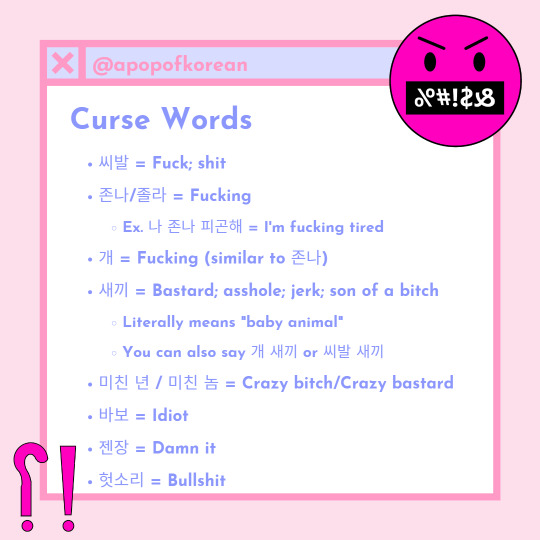
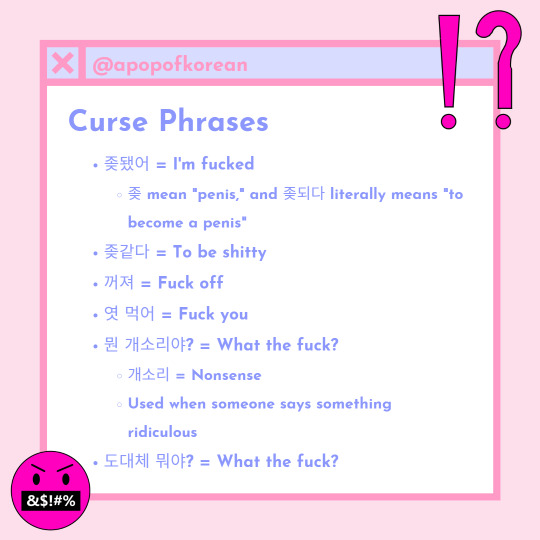

My masterlist
Join my Discord chat here to practice Korean with others!
Follow me on Instagram here for more Korean content!
Get Drops Premium using my affiliate link to expand your Korean vocab!
Check out my Ko-Fi to support this blog and my studies! Thank you for your generosity!
#korean#korean language#korean vocabulary#korean vocab#study abroad#learn korean#learning korean#study korean#studying korean#korean culture#유학#유학생활#한국#한국 문화#어휘#한국어#한국어 공부하기#한국어 배우기#langblr#korean langblr
391 notes
·
View notes
Text
231212 Vocab
반추: rumination, reflection
어떤 일을 여러 번 계속하여 생각함. 또는 그런 일.
The act of constantly thinking about a matter, or such a matter.
역이용하다: turn something to one's own advantage; turn something against itself
어떤 목적을 가지고 있는 것을 그 반대의 목적으로 이용하다.
To use something for a purpose opposed to its original purpose.
어여쁘다: beautiful, lovely
(옛 말투로) 예쁘다.
(old-fashioned) Pretty.
이치: reason, principle, sense
정당하고 도리에 맞는 원리. 또는 근본이 되는 목적이나 중요한 뜻.
A right principle consistent with reason, or underlying purpose or significant meaning.
일구다: create
어떤 현상이나 일 등을 일으키다.
To cause a certain phenomenon, matter, etc.
공통분모: common denominator, something in common
(비유적으로) 여럿 사이에 서로 같은 점.
(figurative) A common point among different people.
궁핍: being poor
물질적으로나 정신적으로 가난하고 여유가 없는 상태.
The state of being materially and mentally poor.
허술하다: shabby; humble
낡고 헐어서 보잘것없다.
Being old and worn out, making it look worthless.
탁상공론: desk theory
실제로 이루어질 가능성이 적은, 헛된 이론이나 논의.
An impractical theory or discussion, whose possibility of coming true is low.
도출: inference
어떤 일에 대한 생각, 결론, 판단 등을 이끌어 냄.
The act of deriving a thought, conclusion, decision, etc., about something.
구현: embodiment, materialization, realization
이념이나 사상, 계획 등을 구체적인 모습으로 나타나게 함.
Making an idea, thought, plan, etc., appear in a concrete form.
#한국어#한국어 공부#공부계#한국어 공부하기#한국어 배우기#new vocab#studyblr#study korean#learning korean#korean#korean vocabulary#south korea#korean language#learning languages#language#langblr#language study#language learning#korean learning#tumblog#tumblr blog#learning#노트정리#공블러
66 notes
·
View notes
Photo

If you're learning Korean, you might have encountered the word "어차피" (eo-cha-pi) at some point. It's a useful word that can be translated to "anyway," "in any case," or "after all." When you use "어차피," you're often indicating that something is inevitable or necessary, regardless of other circumstances.
To use "어차피", you simply need to add it to the sentence.
E.g.
어차피 늦었으니까 천천히 와.
(It's late anyway, so take your time.)
어차피 다른 선택지가 없어.
(There’s no other option anyway.)
그 사람은 어차피 나를 싫어하는 거야.
(That person hates me, after all.)
"어차피" is often used with grammar like ~(으)니까 or -(으)ㄴ/는데 to add more context.
E.g.
어차피 해야 할일이니까 빨리 하고 끝내는게 좋지않겠어요?
(Because it's something you have to do anyway, isn't it better to hurry up and finish it?)
어차피 시간이 없는데 일찍 가는 게 좋을 거야.
(Anyway, since we don't have much time, it's better to leave early.)
어차피 지나간 일이니까 다시 말하지 말아요.
(Since it's a thing of the past anyway, let's not talk about it again.)
어차피 밖에 비가 내리고 있는데 조금더 이야기를 나누자
(It's raining outside anyway, so let's talk a little bit more.)
🌸 🌼 🌻
Support me at: https://koreanlanguageloving.my.canva.site/
#Korean Language#korean langblr#Learn Korean#Study Korean#Hangul#한국어 공부하기#한국어 배우기#한국어 어휘#한국어 연습#한국어#한국어능력시험#한국어공부해요#한국어공부중#한국어공부하기#한국어공부#Korean Vocabulary
344 notes
·
View notes
Text
Some vocab. words from my tutoring sessions the past couple of weeks~
순전하다 - absolute, pure, sheer
학살 - massacre
배후 - back, rear (also used metaphorically for things like "underlying truth" or "mastermind behind ___")
거듭 - once again, once more
잇따르다 - one after another, occur in succession
억압하다 - to suppress
규탄하다 - to denounce
봉쇄하다 - to block, blockade
행사하다 - to use, wield
국한되다 - to be limited (to)
(으)로 치닫다 - to surge, to advance quickly
반토막 - half-piece (토막 = piece of wood, etc)
거론되다 - to be mentioned
일찌감치 - early
반면교사 (反面敎師) - lesson learned from a mistake
불심검문 - police questioning (does not have to be real suspicion, i.e. "stop & frisk")
짓누르다 - to weigh down, press
기리다 - to praise, honor, pay respects to
시험대에 오르다 - to be on trial, to be put to the test (lit. to go up on a test platform)
색맹주의 - color blindness (used exactly the same as in Eng: person who cannot see certain colors & person who "doesn't see race")
관용 - tolerance
육박하다 - to approach, draw near
94 notes
·
View notes
Text
#Kim dawod#south korea#무슬림#한국#한국어#팔레스타인#팔레스타인에#이스라엘#가짜뉴스#فلسطين#가짜#palestine#muslim#gaza#free palestine#israel#jerusalem#i stand with palestine
75 notes
·
View notes
Text
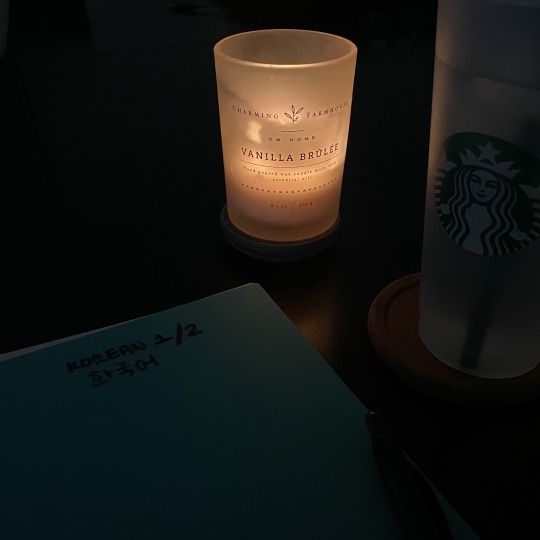
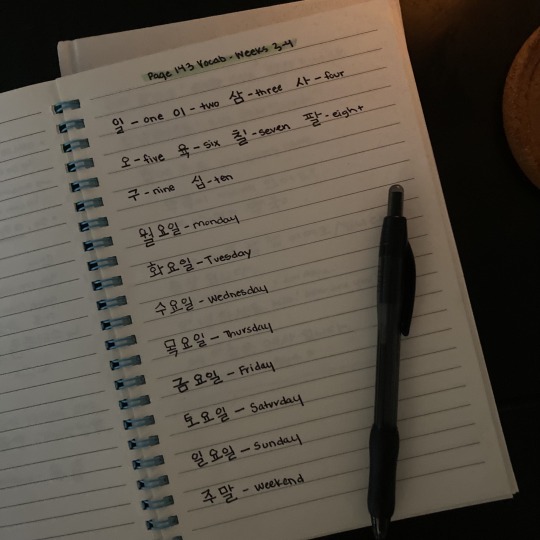
04.05.2024 — A little candle light studying this afternoon with a Corpse Bride playlist for good measure. 👻🕯
오늘 저는 숙제 하고 퀴즈 있습니다. I have also somehow volunteered to be the Quizlet 매니저 for all Korean 3 courses (there’s like 2 or 3 I think), so I may also add our next vocabulary to a new flashcard deck since that’s coming up soon.
My superpower is adding more responsibilities to my schedule despite having no extra time. 🤷���♀️
#학생#한국어#한국어 공부#college student#studying#korean language#studyblr#language student#language study#studying at home#online student#student#language learning#student life#learning korean#studying inspo#study blog#studying korean#study motivation#college work
35 notes
·
View notes
Text
ART HISTORY WORD LIST
I'm slowly reading a book called 청소년을 위한 한국미술사 (Korean Art History for Youth). In the process I came across many interesting terms that may be useful for those who are interested in Korean art and history and maybe would like to read about such topics in Korean in the future. So I decided to share the vocabulary list. Perhaps, to be continued.
선사 [先史] - prehistory
도안 [圖案] - design
암각화 [巖刻畵] - petroglyphs
청동 [靑銅] - bronze
빗살무늬 토기 - comb-pattern pottery
유물 [遺物] - relic, artifact
미의식 [美意識] - aesthetic sense
창의력 [創意力] - creativity
삼국 시대 [三國時代] - Three Kingdoms of Korea
불교 [佛敎] - Buddhism
부처의 현신 [現身] - the Buddha who appeared in the form of a famine in order to save sentient beings
소재 [素材] - material
국교 [國敎] - established religion
강대국 [强大國] - (world) power, powerful nation
학술 [學術] - scholarship
석총 [石塚] - stone grave
석실봉토무덤 [石室封土무덤] - stone-filled tomb
기원전 [紀元前] - B.C. (Before Christ): 기원전 50년 - 50 B.C.
고고학 [考古學] - archaeology
묘제 [墓祭] - a memorial service held before the grave
전기 [前期] - the former part
평면도 - ground plan (architecture)
초상화 [肖像畵] - portrait
고분벽화 [古墳壁畫] - ancient tomb mural
사당 [祠堂] - shrine
신주 [神主] - ancestral tablet
경외감 [敬畏感] - sense of awe
환희 [歡喜] - (great) joy, delight
전달력 [傳達力]- transmission
구체적 [具體的] - detailed
기인하다 [起因하다] - result from
순수 [純粹] - purity
공예품 - handicraft, craftwork
문화재 [文化財] - cultural properties
보관 [保管] - storage
걸작 [傑作] - masterpiece
보고 [寶庫] - repository
청자 [靑瓷] - celadon
극치 [極致] - the height (of)
영토 [領土] - territory, domain
만주 [滿洲] - Manchuria
수나라 [隋나라] - Sui Dynasty
당나라 [唐나라] - Tang Dynasty
명장 [名將] - great commander
저항하다 [抵抗하다] - resist
패망하다 [敗亡하다] - collapse
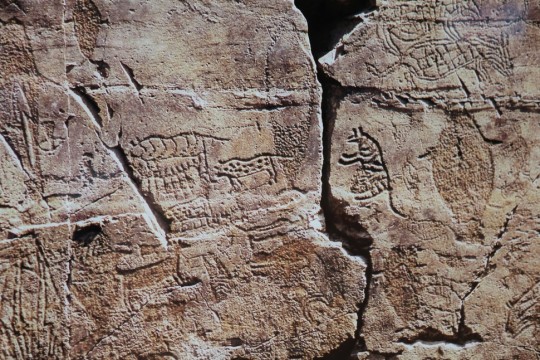
#korean#word list#korean vocabulary#korean language#langblr#learning languages#language study#foreign languages#language blog#korean word of the day#hangul#hanja#korean history#korean art#한국어#한국미술사
58 notes
·
View notes
Text


27 August 2023 I'm back for my annual post! I love Tumblr, but hate updating consistently. Today I'm showing off my academic notebook. I just keep track of notes, thoughts, etc. on my current personal studies (right now, my main focus is on modern Korean history). This is also "traveler's notebook" style, so I keep a couple of thinner books (one for Korean language studies and another for the Korean popular culture class that I'm taking). Happy to answer any questions about my setup or add some more photos. :)
#studyblr#productivity#study space#mechanical keyboard#student#korean studies#한국사#한국어#mine#notebook#study notes
144 notes
·
View notes
Text
Vocabulary: body.
2023년 7월 20일
안녕하세요!
Today i'll share some body's vocabulary.
Head = 머리
Face = 얼굴
Neck = 목
Shoulder = 어깨
Elbow = 팔꿈치
Arm = 팔
Hand = 손
Finger = 손기락
Thigh = 허벅지
Leg = 다리
Knee = 무릎
Feet = 발
Toes = 발가락
Next time i'll get into the face parts!
See you!
#gigiskjourney#korean langblr#korean language#korean learning#korean study#korean vocab list#korean vocabulary#learn korean#learning korean#studyblr#korean study blog#study korean#studying korean#korean#south korea#korea#korean grammar#한국어
246 notes
·
View notes
Note
hi i have a question about how to quote someone. like for example i’m saying my mom asked when we’re going to meet
A: she asked about you
B: what did she ask
A: when we’re going to meet
would it be 널 언제 만날건데?
Hello! If you want to say "My mom asked when we're going to meet," you can say this: 엄마가 우리 언제 만날 거냐고 하셨어요 (or just 했어요 depending on how honorific you want to be). If you're totally new to quoting, I recommend checking out my lessons below since quoting has its own set of rules!
There are a few different grammatical structures used to quote someone in Korean. The quoting structure used in this sentence is -냐고, which is used specifically for quoting questions. Since you're meeting in the future, you attach -을/ㄹ 거냐고 to the verb stem. After that, use can use the verb 하다, which in this case, stands in to mean "to ask," as I did, which I think is the most common verb to use when quoting. Or, you can use 물어보다 meaning "to ask." The reason why 하다 is so common when quoting someone is because the grammar already points to the fact that a question is being asked, so it's ok to just use the short 하다 rather than a specific verb meaning "to ask." Hope that makes sense!
Thanks for the question! As I said, quoting is kinda complicated in Korean, so if you're new to it, it might not make sense to you right now. See my lessons below for more info! 화이팅!
Quoting
Quoting Continued
55 notes
·
View notes


